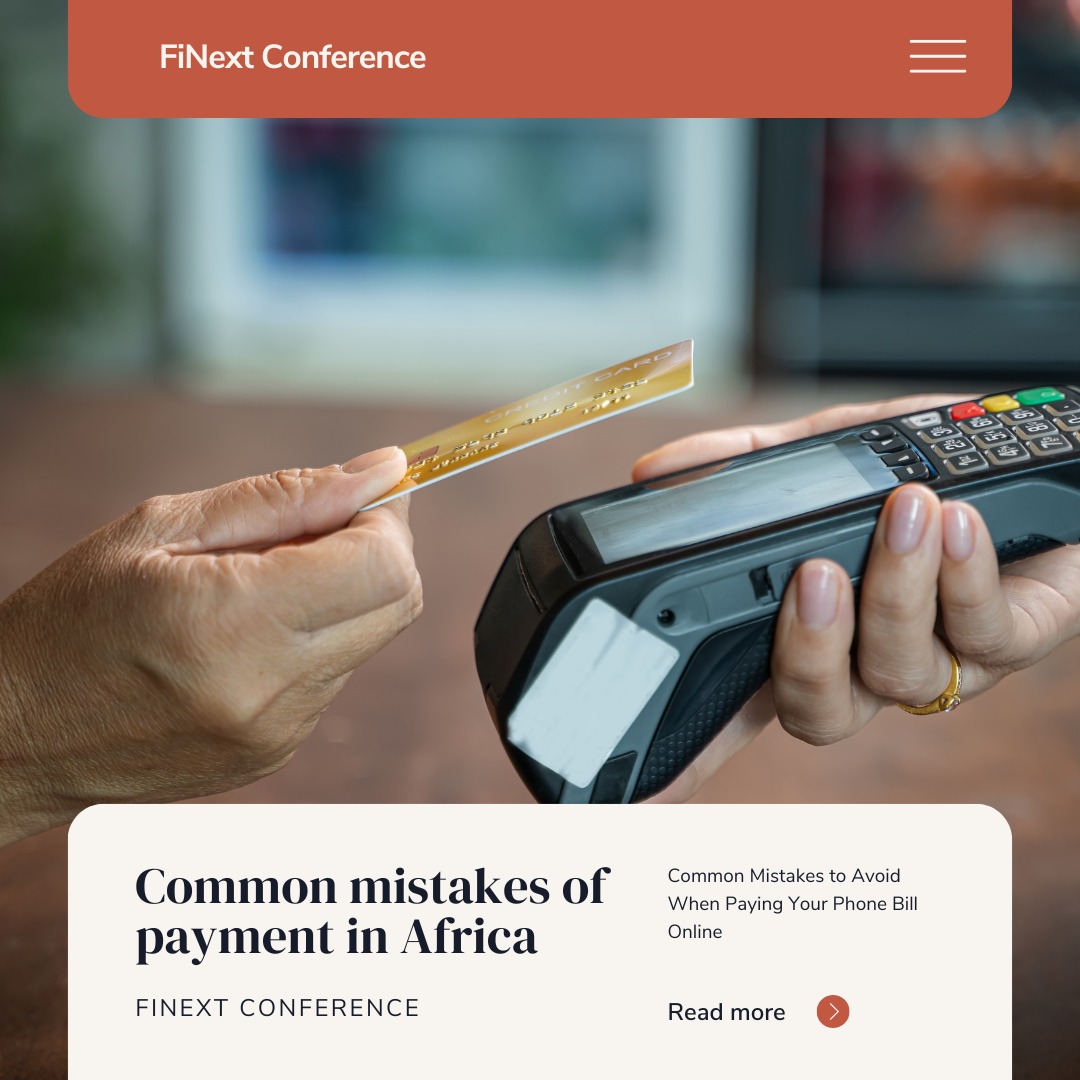Africa is experiencing a significant transformation in its payment systems, driven by increasing mobile penetration, financial inclusion initiatives, and a growing digital economy. Despite these advancements, several common mistakes continue to hinder the efficiency and effectiveness of payment systems across the continent. Understanding these pitfalls is crucial for stakeholders looking to enhance financial services and drive economic growth. 1. Neglecting Local Context and User Needs One of the most common mistakes is failing to tailor payment solutions to the unique needs and contexts of African markets. Solutions developed in other regions might not address local challenges such as intermittent internet connectivity, literacy levels, and cultural nuances. For instance, a sophisticated online banking system might be less effective in rural areas with limited internet access. Successful payment systems often leverage USSD codes and SMS-based transactions to accommodate these conditions. 2. Overlooking Regulatory Compliance Regulatory landscapes in African countries can be complex and vary significantly from one country to another. Ignoring local regulations can result in hefty fines, operational disruptions, or even shutdowns. For example, Nigeria’s Central Bank has strict guidelines for mobile money operators. Companies must engage with regulators early and often to ensure compliance and adapt to evolving regulatory frameworks. 3. Inadequate Security Measures Cybersecurity is a critical concern for payment systems, yet many operators in Africa underestimate its importance. Insufficient security measures can lead to data breaches, financial losses, and loss of customer trust. Implementing robust encryption, multi-factor authentication, and regular security audits are essential steps to safeguard transactions and sensitive data. 4. Poor User Experience and Interface Design User experience (UX) is a key determinant of a payment system’s success. Complex interfaces, slow transaction processing times, and unclear error messages can frustrate users and lead to abandonment. It’s important to design intuitive, user-friendly interfaces that provide clear guidance and feedback, particularly for users who might be new to digital payments. 5. Underestimating the Importance of Customer Support Reliable customer support is crucial for addressing issues and maintaining trust in payment systems. Many providers fail to invest adequately in customer service infrastructure, leading to long resolution times and customer dissatisfaction. Offering multilingual support and training customer service representatives to handle common issues effectively can enhance user satisfaction and loyalty. 6. Limited Interoperability Many payment systems in Africa operate in silos, lacking interoperability with other systems. This fragmentation can inconvenience users who need to manage multiple accounts or platforms. Promoting interoperability between different payment providers and financial institutions can streamline transactions and enhance user convenience. 7. Ignoring the Potential of Mobile Money Mobile money has revolutionized payments in Africa, particularly in East Africa with services like M-Pesa. However, some regions and providers have been slow to adopt or integrate mobile money solutions. Recognizing and leveraging the potential of mobile money can drive financial inclusion and expand the reach of payment services. 8. Inadequate Infrastructure Investment The success of digital payment systems heavily relies on the underlying infrastructure. In many parts of Africa, poor infrastructure—such as unreliable power supply and limited… Continue Reading Common Mistakes in Payment Systems in Africa
Tag: International Banker Awards Morocco
Secure and Swift: The Best Mobile Wallet Apps for 2024
In today’s fast-paced world, mobile wallets have become an indispensable tool for managing finances, making transactions, and even handling identity verification. As we step into 2024, the landscape of mobile wallet apps has evolved with enhanced security features and user-friendly interfaces. Here’s a look at the best mobile wallet apps of the year, focusing on their security measures, swift performance, and unique features. Apple Pay Why It Stands Out:Apple Pay continues to dominate the mobile wallet space with its seamless integration across Apple devices. The app supports contactless payments, online purchases, and even peer-to-peer transactions through iMessage. Key Features:Security: Uses Face ID, Touch ID, and secure tokens for each transaction. Card details are never stored on the device or Apple servers.Speed: Transactions are swift, taking mere seconds for completion.Integration: Works effortlessly with Apple devices, including iPhones, iPads, Apple Watches, and Macs.User Experience:Apple Pay’s intuitive interface and integration with the Apple ecosystem make it a favorite for users who value convenience and security. Google Wallet Why It Stands Out:Google Wallet offers a versatile platform for Android users, enabling easy management of cards, tickets, and loyalty programs. Its integration with Google services enhances user convenience. Key Features:Security: Employs advanced encryption, biometric authentication, and tokenization for transactions.Speed: Efficient and quick transactions, bolstered by Google’s robust infrastructure.Versatility: Supports a wide range of payment options, including NFC payments and online purchases.User Experience:Google Wallet’s clean interface and broad compatibility with Android devices and services make it a reliable choice for millions. Samsung Wallet Why It Stands Out:Samsung Wallet combines the best of Samsung Pay and Samsung Pass, offering a comprehensive solution for payments, digital keys, and more. It’s particularly well-suited for users within the Samsung ecosystem. Key Features:Security: Utilizes Samsung Knox security, biometric authentication, and tokenization.Speed: Near-instantaneous transactions and quick access to stored information.Innovations: Supports MST technology for wider merchant acceptance and integrates with Samsung devices seamlessly.User Experience:Samsung Wallet’s all-in-one approach and focus on security make it a top choice for Samsung device users. PayPal Why It Stands Out:PayPal remains a trusted name in digital payments, with its mobile wallet app providing a reliable platform for transactions, money transfers, and online shopping. Key Features:Security: Advanced encryption, two-factor authentication, and fraud protection.Speed: Quick transfers and payments, with extensive support for various currencies.Global Reach: Widely accepted by merchants worldwide, making it ideal for international transactions.User Experience:PayPal’s long-standing reputation and comprehensive features offer users a secure and efficient way to manage their finances on the go. Venmo Why It Stands Out:Venmo, owned by PayPal, is popular for its social approach to payments, making it easy to split bills and share expenses among friends. Key Features:Security: Utilizes encryption and multi-factor authentication to protect user data.Speed: Instant transfers and payments, with options for quick bank withdrawals.Social Integration: Unique social feed for transactions, adding a social element to payments.User Experience:Venmo’s fun and social interface, combined with robust security features, make it a favorite among younger users and groups of friends. ConclusionThe best mobile wallet apps of 2024 combine top-notch security with swift… Continue Reading Secure and Swift: The Best Mobile Wallet Apps for 2024
In today’s fast-paced and dynamic business environment, finance remains one of the most rewarding and exciting fields. Whether you are a recent graduate deciding on a career path or a professional looking to pivot, here are five compelling reasons to grow your career in finance. Diverse Career OpportunitiesFinance is a broad field with numerous specializations and career paths. Whether you are interested in investment banking, financial planning, corporate finance, asset management, or financial analysis, there is a niche for every interest. This diversity allows you to tailor your career to your strengths and passions. Additionally, the skills you acquire in finance are transferable across various industries, including technology, healthcare, and entertainment, providing endless possibilities for career growth. Strong Earning PotentialOne of the most attractive aspects of a career in finance is the potential for high earnings. According to the U.S. Bureau of Labor Statistics, the median annual wage for business and financial occupations was significantly higher than the median for all occupations. Roles in finance often come with lucrative bonuses and commissions, especially in investment banking and sales. As you gain experience and advance in your career, the financial rewards can increase substantially. Continuous Learning and DevelopmentThe finance industry is ever-evolving, with new regulations, technologies, and market trends constantly emerging. This dynamic environment ensures that you are always learning and developing new skills. Pursuing certifications such as Chartered Financial Analyst (CFA) or Certified Financial Planner (CFP) can further enhance your knowledge and career prospects. Continuous learning keeps your job interesting and ensures you stay competitive in the market. Impact and InfluenceFinance professionals play a critical role in shaping the strategic direction of organizations. Whether you are analyzing data to guide investment decisions, managing financial risks, or advising on mergers and acquisitions, your work has a direct impact on the success and growth of businesses. This level of influence can be incredibly fulfilling and provides a sense of purpose and accomplishment in your career. Global OpportunitiesFinance is a global industry, and the skills you develop are in demand worldwide. Many finance roles offer opportunities for international travel and exposure to global markets. Working for multinational corporations or in major financial hubs such as New York, London, Hong Kong, and Singapore can broaden your professional network and enhance your career prospects. The global nature of finance also means that you can find opportunities to work abroad or with international clients, adding an exciting dimension to your career. ConclusionA career in finance offers diverse opportunities, strong earning potential, continuous learning, significant impact, and global prospects. Whether you are just starting out or looking to advance, the finance industry provides a dynamic and rewarding career path. Investing in your finance career not only promises personal growth but also the chance to make a meaningful difference in the business world. Embrace the challenge and embark on a fulfilling journey in the world of finance! Read More 5 ways to grow your money with fintech
5 ways to growing in fintech industry
5 ways to growing in fintech industry



